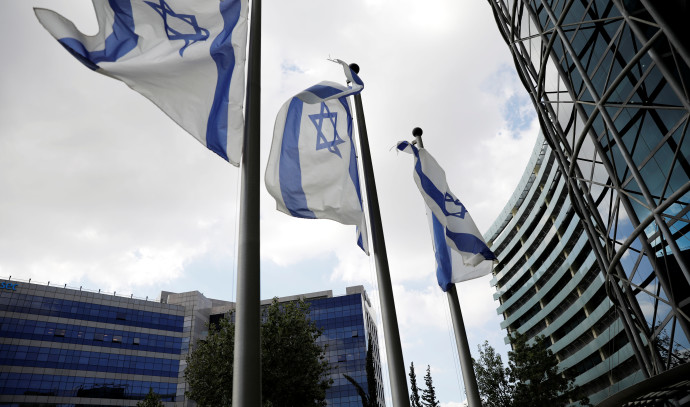ARTICLE AD BOX
Diplomatic pragmatism paired with nuclear brinkmanship – makes the coming months a critical period for Israeli and international policymakers.
By KAREN AMOUYAL DECEMBER 12, 2024 00:13 Updated: DECEMBER 12, 2024 00:42 HEZBOLLAH FLAGS flutter atop a poster depicting Hassan Nasrallah, in southern Lebanon, near the border with Israel, on October 8, 2023. The collapse of Bashar al-Assad’s regime in Syria marks the end of an era, the writer asserts.
(photo credit: REUTERS)
HEZBOLLAH FLAGS flutter atop a poster depicting Hassan Nasrallah, in southern Lebanon, near the border with Israel, on October 8, 2023. The collapse of Bashar al-Assad’s regime in Syria marks the end of an era, the writer asserts.
(photo credit: REUTERS)
The collapse of Bashar Assad’s regime in Syria marks the end of an era. For over five decades, the Assad dynasty ruled Syria, positioning it as a critical ally for Iran and a cornerstone of the so-called “Axis of Resistance.” Now, with the Syrian regime’s fall, the Middle East is entering uncharted territory – one that presents both significant challenges and opportunities, particularly for Israel.
Since October 8, 2023, the northern border of Israel has been anything but quiet. Hezbollah, emboldened by Iran and deeply entrenched in Lebanon, has escalated hostilities. The group has sought to exploit Israel’s focus on Gaza, where the IDF is engaged in dismantling Hamas and working to secure the release of over 100 hostages taken on October 7.
But Hezbollah’s strategic calculus has always relied heavily on the support of its patron in Tehran and the land bridge connecting Iran to Lebanon via Syria. With Assad’s regime gone, that corridor is shattered, and Hezbollah faces a dramatically altered battlefield.
For Iran, Syria under Assad was far more than an ally; it was a lifeline. The land corridor connecting Tehran to Damascus and Beirut enabled the seamless transfer of advanced weapons systems to Hezbollah and the deployment of Iranian fighters and advisers. This axis gave Iran the capacity to project power across the Levant, encircling Israel and bolstering Hezbollah’s arsenal.
Now, the fall of Damascus leaves Hezbollah isolated. Without Syria’s logistical and strategic depth, the group’s ability to replenish its weapons stockpiles, already degraded by Israeli airstrikes, will be severely constrained. Hezbollah’s infrastructure has been targeted relentlessly by the IDF in both Lebanon and Syria, and the loss of Assad’s regime only deepens the cracks in its armor.
Iran's response
The timing of this shift couldn’t be more significant. Hezbollah’s aggression on Israel’s northern border was part of a broader Iranian strategy to pressure Israel from multiple fronts during its war with Hamas. That strategy now faces a formidable obstacle. A weakened Hezbollah, cut off from its supply lines, will struggle to maintain its current level of hostility toward Israel.
Iran’s response to Assad’s fall will likely follow two parallel paths. On one hand, Tehran may seek to stabilize its regional position through diplomacy. Iran has been cornered economically and politically, and the loss of Syria diminishes its leverage. Talks with the United States and regional actors may offer a way to ease sanctions and buy time.
On the other hand, a weakened Iran may choose to double down on its pursuit of nuclear weapons. The collapse of its proxy network, from Gaza to Beirut, leaves Tehran with fewer conventional options to deter Israel and the United States. A nuclear Iran would dramatically alter the balance of power, and the regime may calculate that the only way to secure its survival is through the ultimate deterrent.
This dual strategy – diplomatic pragmatism paired with nuclear brinkmanship – makes the coming months a critical period for Israeli and international policymakers.
FOR ISRAEL, Assad’s fall is both a strategic win and a cautionary tale. The immediate benefit is clear: the disruption of Iran’s weapons pipeline to Hezbollah weakens a primary threat to Israeli security. But the collapse of Syria also introduces new uncertainties.
Stay updated with the latest news!
Subscribe to The Jerusalem Post Newsletter
The rise of Hayat Tahrir al-Sham (HTS) and other Sunni rebel groups in Syria could lead to further destabilization along Israel’s northern border. While these groups are hostile to Iran, they are no allies of Israel either. The power vacuum in Syria may attract extremist factions eager to exploit the chaos, forcing Israel to prepare for threats from new, unpredictable actors.
Turkey’s growing influence in northern Syria also demands attention. Ankara has long viewed the region as a zone of strategic interest, and its ambitions may now clash with both Israeli and Iranian priorities. Meanwhile, Sunni Arab states, emboldened by Iran’s setbacks, may seek to capitalize on Assad’s fall by strengthening their alliances with Israel.
As I reflect on these developments, I am reminded that the Middle East is a region defined by its capacity for rapid, seismic change. The fall of Assad is not just the end of a dictatorship; it’s the beginning of a new chapter in the region’s history. For Israel, this moment offers a chance to reshape its northern security landscape, but it also demands vigilance.
Iran’s Axis of Resistance is undeniably weakened, but Tehran is not out of the game. Whether it retreats, recalibrates, or escalates its nuclear ambitions will shape the region’s future.
For those of us watching from the front lines – whether in the North or South of Israel – this is a moment of opportunity and danger. The stakes are as high as ever. How Israel navigates this shifting landscape will determine not only its security but also its place in a Middle East that, once again, is reinventing itself.
The writer is a new immigrant from France who made aliyah in October 2022. She currently works as the press and media coordinator for the Zionist Organization of America, where she advocates for Zionist values and supports pro-Israel initiatives globally.

 2 weeks ago
67
2 weeks ago
67








 English (US) ·
English (US) ·